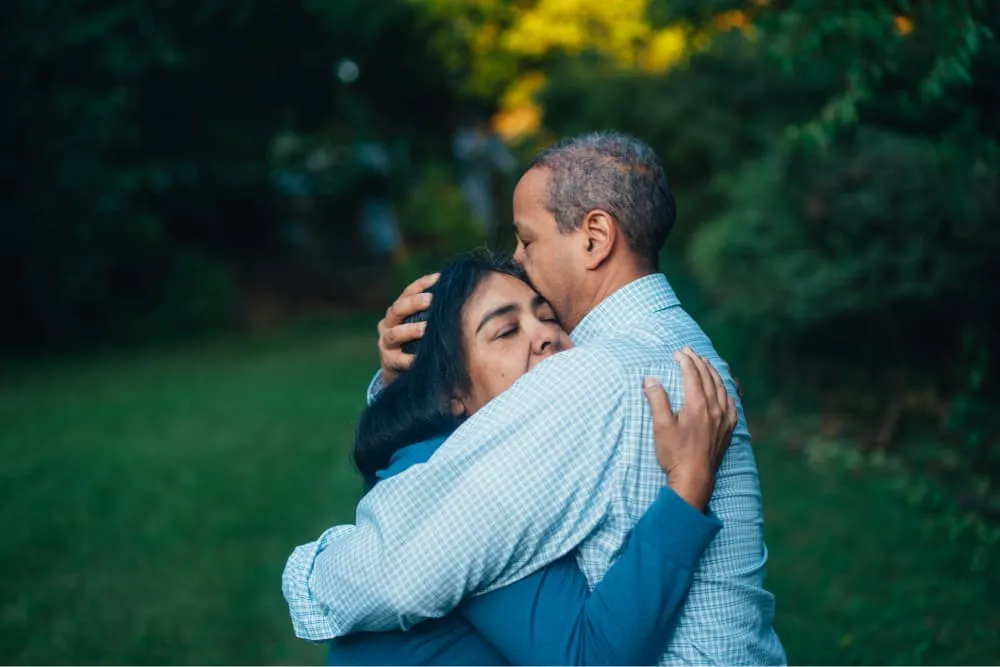What is emotional eating?
Emotional eating is the practice of consuming food in response to feelings rather than physical hunger. This typically involves cravings for comfort foods, which are usually high in sugar, fat, or carbohydrates.6 Knowing how this affects you is the first step to overcoming the behavior.
The impact of emotional eating
Emotional eating is linked with a greater risk of binge eating behaviors and eating while not hungry.1
One study suggests that emotional eating links depression to an increase in body mass index (BMI) and waist circumference (WC). This means that people who are depressed may be more likely to engage in emotional eating, which in turn leads to weight gain over time.2
Over time, emotional eating can result in excessive weight gain, which is associated with numerous health risks such as heart disease, diabetes, and certain cancers.3
In addition, emotional eating can create a vicious cycle, where individuals eat to cope with negative emotions, feel bad about their eating behavior, and then experience more negative emotions, like guilt and shame. This can worsen feelings of depression and anxiety as well, making it difficult to break free from the cycle of emotional eating.
Learn about virtual treatment for eating disorders
Learn Common triggers of emotional eating
Knowing the common triggers of emotional eating is the first step toward addressing them. Learning your triggers helps you anticipate and prepare for them, which can help reduce the likelihood of using food as a coping mechanism.
Emotional triggers
Emotions can significantly affect your behavior. The following emotions can often trigger emotional eating, even if you are not physically hungry:
- Loneliness
- Anxiety
- Depression
- Anger
- Happiness
- Boredom
It’s not the emotions themselves that are necessarily the problem. Rather, struggling to recognize, express, and cope with these emotions is what can lead to emotional eating.
4 Environmental and social triggers
In addition to emotional triggers, both your environment and the people you interact with can significantly influence emotional eating.
For example, having easy access to comfort foods can influence you to eat more when experiencing intense emotions. A lack of healthy food choices can also push you towards less nutritious options.
Aside from that, specific environments, such as parties, celebrations, and buffet restaurants can encourage overeating, especially when combined with emotional stress.
Psychological triggers
Stress,
trauma, and poor self-esteem can cause emotional eating.
For instance, for people who experience long-term stress, emotional eating can be a way to self-soothe and boost their mood. One study found that 33% of adults who overeat or select unhealthy foods when stressed do so because they believe it helps take their mind off the stress.
5Food may also provide temporary relief from the distress of past traumatic experiences or emotional memories. Those with negative self-images may eat to help temporarily fill a perceived void.
Practical strategies for overcoming emotional eating
Overcoming emotional eating requires a combination of self-awareness and healthy coping mechanisms.
Identify your triggers
Become aware of your emotions as they arise. Record how you’re feeling before, during, and after eating. Review your journal from time to time to identify patterns. Are there specific emotions or situations that consistently lead to emotional eating? Also, consider the circumstances around you when you feel the urge to eat emotionally.
Learn to process your emotions
Emotional eating is often a way to cope with uncomfortable feelings rather than addressing them directly. You can break the cycle by
learning to process your emotions. This involves recognizing your emotions, accepting them, and listening to what they tell you. Then, feel the emotion and decide what to do about it—whether to let it pass, talk to a friend about it, address your distorted thoughts, or use another strategy.
Choose healthy coping mechanisms
Substitute emotional eating with other activities, like taking a walk, cleaning or organizing a small space in your home, calling a friend, reading a book, or participating in a hobby you enjoy.
Reach out for help
Talk to friends, family, or a therapist about your struggles with emotional eating. Sharing your feelings and receiving support can reduce the urge to turn to food for comfort.
Create a balanced relationship with food
Developing a healthy relationship with food helps emotional eaters shift their focus from using food as a coping mechanism to enjoying it as a source of nourishment.
Start by reflecting on your views about food. Do you see it as a reward, comfort, or distraction? Understanding these associations can help you shift your mindset toward seeing food as a source of fuel and enjoyment, not a solution to emotional distress.
Having black-and-white thoughts about food, such as labeling foods as “good” or “bad,” is also a sign of an unbalanced relationship. Work on reframing these beliefs. All foods can fit into a balanced diet, and it’s important to avoid guilt or shame around eating certain foods.
Finally, practice mindful eating. Focus on the sensory experience of eating—the taste, texture, smell, and appearance of food. This helps you stay present, enjoy your food more, and reduce the likelihood of overeating.
Setbacks and challenges are normal
You may encounter challenges during your journey to overcoming emotional eating.
However, instead of seeing setbacks as failures, view them as opportunities to learn more about yourself and how to better manage triggers in the future. Reflect on what led to the setback and consider what you can do differently next time.
Be gentle with yourself during setbacks. Emotional eating is a complex issue, and overcoming it can take time. Criticizing yourself can lead to more emotional distress, which can worsen the cycle of emotional eating. On the other hand, having self-compassion can motivate you to overcome your difficulties.
Understand that change doesn’t happen overnight! Overcoming emotional eating is a process that involves ups and downs. Stay patient and keep moving forward, even when progress feels slow.
Trust in your ability to change
Overcoming emotional eating requires acknowledging that you can break free from using food as a coping mechanism. Trusting in your ability to change means believing that you can develop healthier ways to manage your emotions.
By embracing this trust in your ability to change, you reinforce the belief that you can overcome emotional overeating and build a healthier, more balanced relationship with food.


























%2520THUMB.webp)






























.webp)
































